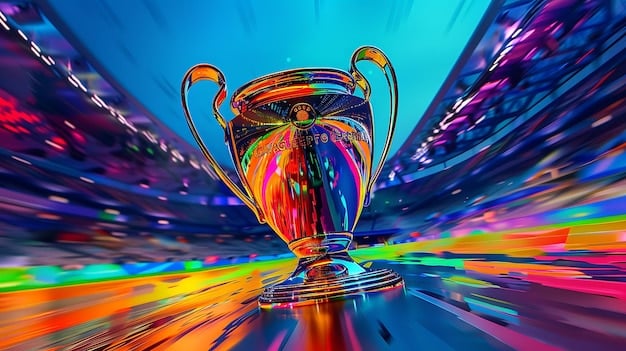World Cup 2026: Relive Most Memorable Moments in History

The journey to the World Cup 2026: The Most Memorable Moments in World Cup History is an opportune time to reflect on iconic events that have shaped football’s grandest stage, from legendary goals to unimaginable upsets, showcasing the enduring magic of the tournament’s past.
The Genesis of Glory: Early Eras and Unforgettable Beginnings
As we anticipate the shared spectacle that will be the World Cup 2026: The Most Memorable Moments in World Cup History, it feels appropriate to journey back to where it all began. The early World Cups laid the groundwork for what would become the planet’s most beloved football tournament, each edition etching indelible memories into the collective consciousness.
Uruguay 1930: The Inaugural Spectacle
The very first World Cup in Uruguay in 1930 was an experiment that proved to be a resounding success. Amidst the economic turmoil of the Great Depression, the spirit of football brought nations together, culminating in a historic final.
- 🏟️ First Host Nation Triumph: Uruguay, as the host, showcased its footballing prowess by defeating Argentina 4-2 in the final.
- 🤝 Spirit of Sportsmanship: Despite rivalries, the tournament fostered a sense of camaraderie that transcended national borders.
- 🌟 Birth of a Legend: The event established the World Cup as a premier international competition, paving the way for its incredible future.
Italy 1934 and France 1938: European Dominance and War Clouds
The subsequent editions in Italy and France saw European teams assert their dominance, with Italy securing back-to-back titles. These tournaments were played under the looming shadow of global conflict, yet they served as powerful reminders of sport’s ability to unite and uplift.
Italy’s methodical play and tactical brilliance under Vittorio Pozzo set a new standard for international football, while France 1938, though overshadowed by impending war, featured exhilarating matches and dramatic outcomes.
The earliest World Cups, though perhaps less televised or globally accessible than modern iterations, were pivotal. They forged the traditions and set the high bar for competitive intensity that defines the tournament even today. The stories from these nascent years speak to the raw passion and unwavering commitment that football inspires, laying the foundation for all the memorable moments that would follow.
Iconic Goals: Strokes of Genius and Moments of Pure Magic
Football, at its heart, is about goals. And in the World Cup, certain goals transcend mere scoring, becoming legendary feats of skill, artistry, or sheer audacity. These moments are replayed countless times, their impact reverberating through generations of fans.
Maradona’s “Goal of the Century” (1986)
Perhaps the most talked-about individual effort in World Cup history, Diego Maradona’s second goal against England in the 1986 quarter-finals is a masterpiece. It embodied his genius and ability to single-handedly change a game’s outcome.
- 🏃 Dribbling Masterclass: Maradona received the ball in his own half and proceeded to dribble past five English outfield players and the goalkeeper.
- 🥅 Unstoppable Finish: He then slotted the ball into an empty net, a testament to his incredible control and vision.
- 🗣️ Lasting Legacy: This goal cemented Maradona’s status as one of football’s all-time greats, a moment of pure, unadulterated individual brilliance.
Pelé’s Electrifying Goals (1958 & 1970)
Pelé, the undisputed “King of Football,” graced multiple World Cups with his extraordinary talent. His goals were not just statistics; they were exhibitions of joy and innovation.
In 1958, as a teenager, he scored six goals, including a hat-trick in the semi-final and two in the final, one of which involved a breathtaking flick over a defender before a volley. In 1970, his header in the final against Italy, and his deceptive run and pass for Carlos Alberto’s iconic goal, showcased his all-around brilliance and vision.
From Dennis Bergkamp’s exquisite touch and turn against Argentina in 1998, to Roberto Carlos’ impossible free-kick in 1997, or even the dramatic late winner from Andrés Iniesta in the 2010 final, these goals are more than just points on a scoreboard. They are narratives compressed into seconds, demonstrating human potential and the sheer unpredictability of football. Each one tells a unique story, cementing its place in the annals of World Cup lore.
Unforgettable Upsets: When Underdogs Roared
The beauty of the World Cup lies not only in the triumphs of the expected but also in the stunning defeats of giants. These upsets are the moments that truly capture the imagination, proving that on any given day, an underdog can achieve the seemingly impossible.
The “Miracle of Bern” (1954)
West Germany, a nation still recovering from the war, faced the seemingly invincible Hungarian “Magical Magyars” in the 1954 final. Hungary had been unbeaten for four years and had crushed West Germany 8-3 earlier in the tournament. What followed was one of the greatest shocks in sports history.
- 📉 Overcoming Adversity: West Germany came back from a two-goal deficit to win 3-2.
- 🇩🇪 National Rebirth: This victory had profound social and psychological significance for post-war Germany, symbolizing its resurgence.
- ⚽ Tactical Brilliance: The West German team, led by coach Sepp Herberger, demonstrated remarkable tactical discipline and resilience.
Cameroon Stuns Argentina (1990)
The opening match of the 1990 World Cup saw defending champions Argentina, led by Diego Maradona, humbled by a vibrant Cameroon side. Despite being reduced to nine men, the African team clinched a famous 1-0 victory.
This match was a defiant statement, not just from Cameroon, but from African football as a whole. It showed the world that African nations could compete at the highest level, playing with a unique blend of athleticism, flair, and tenacity.
Other notable upsets include North Korea defeating Italy in 1966, Senegal overcoming reigning champions France in 2002, and South Korea’s surprising run to the semi-finals in 2002. These moments serve as powerful reminders that in football, reputation counts for little once the whistle blows. They inject a sense of raw drama and unpredictability, which is vital to the World Cup’s enduring appeal. These are the stories that resonate far beyond the final whistle, embodying the spirit of hope and defiance against overwhelming odds.
Legendary Performances: Individuals Who Defined Tournaments
While the World Cup is ultimately a team competition, certain individuals have elevated their play to such extraordinary levels that they almost single-handedly carried their nations or carved out legendary legacies. Their performances are etched into the tournament’s rich tapestries.
Pelé’s Arrival (1958)
At just 17 years old, Pelé exploded onto the global stage in Sweden, transforming Brazil’s fortunes and setting new benchmarks for attacking football. His youthful exuberance combined with unparalleled skill was a revelation.
- ✨ Teenage Prodigy: Pelé scored a hat-trick in the semi-final against France and two crucial goals in the final against Sweden.
- 🇧🇷 Brazil’s First Title: His contributions were instrumental in securing Brazil’s maiden World Cup trophy.
- 🌍 Global Icon: The tournament announced Pelé as a truly global superstar, defining the role of the modern attacking forward.
Diego Maradona’s Mexico Masterclass (1986)
Maradona’s performance in Mexico 1986 is arguably the greatest individual showing in World Cup history. He led Argentina to glory, overcoming formidable opponents almost entirely through his own brilliance.
Beyond the “Hand of God” and “Goal of the Century,” Maradona was the orchestrator, the leader, and the primary goal threat for Argentina. Every attack seemed to flow through him, and his vision, dribbling, and passing were simply breathtaking. His ability to perform under immense pressure and inspire his teammates was unparalleled.

Zinedine Zidane’s Poetic Farewell (2006)
Zidane’s final World Cup for France was a bittersweet symphony of genius and controversy. He guided an unfancied French side to the final with a series of sublime performances, rolling back the years with his elegant control and tactical intelligence. His penalty in the final against Italy oozed composure and audacious confidence.
Though his career ended with the infamous headbutt, Zidane’s overall tournament was a masterclass in midfield play and leadership. His legacy from that tournament is primarily one of a player still capable of mesmerizing brilliance at the highest level, reminding us of the enduring power of individual talent to shape collective destinies.
Dramatic Finales: Edge-of-Your-Seat Encounters
The World Cup final is the pinnacle of international football, a single match that defines legacies and national pride. Over the decades, many finals have delivered unforgettable drama, pushing teams to their absolute limits and creating iconic moments of triumph and despair.
Germany vs. Brazil (2002): Ronaldo’s Redemption
This final, marking the first time these two footballing giants had met in a World Cup final, was a story of redemption for one of the game’s greatest strikers. After the disappointment of the 1998 final, Ronaldo delivered when it mattered most.
- 🥅 Two-Goal Hero: Ronaldo scored both goals in Brazil’s 2-0 victory, securing their record fifth title.
- 🌟 Personal Triumph: His performance was a poignant comeback from injury struggles, cementing his place as one of the game’s elite.
- 🌎 Global Audience: This final was a truly global spectacle, showcasing the beautiful game to billions.
Italy vs. France (2006): Zidane’s Swansong and Controversy
The 2006 final was a tense, tactical battle, remembered as much for its dramatic conclusion as for the football itself. It pitted two European powerhouses against each other, with the added narrative of Zinedine Zidane’s final professional match.
The game was tied 1-1 after extra time, with Zidane famously scoring an audacious chip penalty. However, his moment of brilliance was overshadowed by his headbutt on Marco Materazzi, resulting in a red card. Italy ultimately won the trophy in a penalty shootout, adding another layer of heart-stopping tension to an already iconic final.
Other classic finals include the 1970 encounter between Brazil and Italy, seen as a clash of footballing philosophies, and the 2014 final where Germany’s tactical precision ultimately overcame Argentina’s resilience. These matches are not just competitions; they are grand narratives played out on the world stage, stories of courage, skill, heartbreak, and ultimate glory. They embody the very essence of memorable moments in World Cup History.
Technological Evolutions and Their Impact
The World Cup is not just about the players and the games; it’s also a testament to how technology has shaped our experience of the sport. From rudimentary radio broadcasts to immersive digital experiences, technology has continually enhanced how we watch, analyze, and remember the World Cup.
From Black & White to High Definition
The advent of television transformed the World Cup from a local event into a global phenomenon. Early broadcasts captured the raw energy of the games, despite limitations in picture quality.
- 📺 Global Reach: Television brought the World Cup into homes across continents, multiplying its audience exponentially.
- 🔄 Instant Replays: The ability to rewatch key moments immediately deepened fan engagement and analysis.
- 🎨 Vibrant Imagery: As color television became standard, the World Cup’s vibrant spectacle truly came alive for viewers.
Goal-Line Technology and VAR: Ensuring Fairness
More recently, controversial decisions have led to the implementation of technologies designed to assist referees and ensure fair play. These innovations, though sometimes debated, aim to improve the accuracy of crucial calls.
Goal-line technology, introduced after several high-profile disputed goals, uses electronic systems to determine unequivocally whether the ball has crossed the goal line. Similarly, the Video Assistant Referee (VAR) system allows for review of critical incidents, such as penalty decisions, red card incidents, and mistaken identity.
While these systems have their critics, they represent a significant step towards greater objectivity in officiating. They ensure that some of the most memorable moments in World Cup history, whether iconic goals or dramatic red cards, are determined with the highest possible level of accuracy, adding another layer of scrutiny and integrity to the beautiful game. As we look towards World Cup 2026: The Most Memorable Moments in World Cup History, expect further technological advancements to shape the viewing experience and the game itself.
| Key Moment | Brief Description |
|---|---|
| ⚽ Maradona’s ‘Goal of the Century’ | Diego Maradona’s incredible solo effort against England in 1986. |
| 🏆 ‘Miracle of Bern’ | West Germany’s surprising victory over Hungary in the 1954 final. |
| 👑 Pelé’s 1958 Debut | Teenage Pelé’s explosive performance leading Brazil to their first title. |
| 📸 Technological Advances | Evolution of viewing and officiating, from TV broadcasts to VAR. |
Frequently Asked Questions about World Cup History
▼
Many fans consider Diego Maradona’s “Goal of the Century” against England in the 1986 World Cup as the most iconic. His mesmerizing dribble from his own half past five defenders and the goalkeeper is often cited for its sheer brilliance and individual skill. It truly stands as a testament to his unique talent on the grandest stage.
▼
The “Miracle of Bern” refers to West Germany’s unexpected victory over the heavily favored Hungarian team in the 1954 World Cup final. Hungary’s “Magical Magyars” were unbeaten for years, and their loss was a massive surprise, having immense symbolic value for post-war Germany, resonating beyond just football.
▼
While subjective, many analysts and fans point to Diego Maradona’s performance in the 1986 World Cup as the greatest individual showing. He almost single-handedly led Argentina to the trophy with a series of sublime displays, including two of the most famous goals ever scored in the tournament’s knockout stages.
▼
Technology has significantly impacted the modern World Cup. Innovations like goal-line technology ensure accurate scoring decisions, preventing controversial ghost goals. The introduction of the Video Assistant Referee (VAR) system has also played a crucial role in re-evaluating critical on-field decisions, impacting game-changing moments and adding a layer of objective verification.
▼
A dramatic World Cup final typically features high stakes, unexpected turns, and moments of individual brilliance or crucial errors. Close scores, comebacks, extra time, penalty shootouts, and significant controversies often contribute to a final being remembered. The blend of tension, skill, and human emotion creates truly unforgettable sporting spectacles for fans worldwide.
Conclusion
As we eagerly await the **World Cup 2026: The Most Memorable Moments in World Cup History**, the anticipation is naturally tinged with reflections on the past. The tournament’s rich tapestry is woven with legendary goals, incredible upsets, and individual performances that have transcended sport to become part of global cultural memory. From Pelé’s youthful exuberance to Maradona’s singular genius, and the dramatic narratives of finals decided by inches or by a single, breathtaking moment, each World Cup has contributed its unique chapter. These moments are not merely highlights; they are testaments to the human spirit of competition, the beauty of the game, and its unparalleled ability to unite people across diverse backgrounds. They set the stage for 2026, where new legends will emerge and fresh memories will be minted for generations to come, proving that the World Cup’s magic endures.





